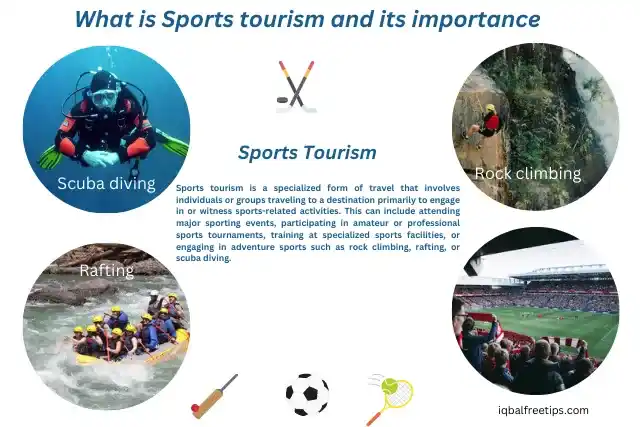
What is Sports tourism and its importance?
Sports tourism has become an increasingly popular way for individuals to explore new destinations, experience different cultures, and engage in sports-related activities. Whether it’s attending major sporting events, participating in amateur or professional sports tournaments, or engaging in adventure sports, sports tourism offers a unique way to challenge oneself physically and mentally while creating memorable experiences. In this blog, we will explore the world of sports tourism, its importance, the activities involved, and the benefits it offers to both the traveler and the destination.
What is Sports tourism?
Sports tourism is a specialized form of travel that involves individuals or groups traveling to a destination primarily to engage in or witness sports-related activities. This can include attending major sporting events, participating in amateur or professional sports tournaments, training at specialized sports facilities, or engaging in adventure sports such as rock climbing, rafting, or scuba diving.
Sports tourism offers a unique way to experience different cultures, meet new people, and challenge oneself physically and mentally while creating memorable experiences. It also has significant economic and social benefits, promoting local businesses and generating revenue for the destination while fostering a sense of community and enhancing the well-being of individuals involved.
Importance of Sports Tourism
It plays an important role in promoting economic, social, and cultural development for both the traveler and the destination. Here are some of the key reasons why sports tourism is important:
Economic Impact
Sports tourism can have a significant economic impact on the destination, generating revenue from tourism-related activities such as accommodations, food, transportation, and entertainment. This can also create employment opportunities for the local population.
Cultural Exchange
Sports tourism provides opportunities for travelers to experience new cultures, meet new people, and participate in local customs and traditions. This helps to promote cultural understanding and appreciation among different communities.
Health and Well-being
Sports tourism promotes physical activity and encourages individuals to engage in healthy behaviors, such as exercise and outdoor recreation.
Community Building
Sports tourism can help to build a sense of community and pride within the destination, as local residents come together to support sporting events and celebrate their cultural heritage.
Environmental Conservation
Many sports tourism activities take place in natural environments such as parks, mountains, and beaches. Responsible sports tourism can promote environmental conservation and sustainable practices that protect these important natural resources.
Destination Promotion
Sports tourism can be a powerful tool for promoting a destination to a global audience. By hosting high-profile sporting events, destinations can showcase their unique cultural offerings, natural beauty, and infrastructure to potential visitors.
Infrastructure Development
Hosting sports events requires significant investment in infrastructure, such as stadiums, training facilities, and transportation systems. These investments can have long-term benefits for the destination, enhancing its overall quality of life and attractiveness to both visitors and residents.
Educational Opportunities
Sports tourism can offer educational opportunities for travelers, particularly young people. By participating in sports clinics, training programs, and cultural activities, travelers can gain new skills, knowledge, and perspectives that can benefit them in the future.
Brand Awareness
Hosting major sports events can enhance a destination’s brand awareness and reputation, attracting attention from international media and potential investors.
Social Impact
Sports tourism can have a positive social impact on the destination, promoting inclusivity, diversity, and equality. By promoting sports and physical activity among different communities, sports tourism can help to break down barriers and foster greater social cohesion.
Sports tourism has the potential to provide significant benefits for both the traveler and the destination, promoting economic growth, cultural exchange, and social well-being.
What are the activities of sports tourism?
Sports tourism encompasses a wide range of activities that can be grouped into several categories. Here are some of the most common activities of sports tourism.
It offers a diverse range of activities and experiences, catering to a wide range of interests and preferences. From participating in sports activities to watching world-class events, visiting museums or halls of fame, and staying at sports-themed resorts, sports tourism provides opportunities for travelers to engage with their favorite sports and create memorable experiences.
Spectator Sports
This involves traveling to a destination to watch a sporting event, such as a major league game, international competition, or Olympic Games.
Active Sports
This involves traveling to participate in sports activities, such as golfing, skiing, surfing, hiking, or kayaking.
Adventure Sports
This involves traveling to participate in outdoor activities that involve an element of risk or challenge, such as rock climbing, white water rafting, bungee jumping, or skydiving.
Sports Training
This involves traveling to a destination to participate in sports training programs, clinics, or camps, typically for specific sports such as tennis, soccer, or basketball.
Sports Events
This involves traveling to a destination to participate in sports events or tournaments, such as marathons, triathlons, or cycling races.
Sports Museums and Halls of Fame
This involves traveling to visit museums or halls of fame dedicated to sports, such as the Baseball Hall of Fame, the Pro Football Hall of Fame, or the International Tennis Hall of Fame.
Sports-themed tours
This involves traveling to a destination to take a sports-themed tour, such as a baseball stadium tour, soccer stadium tour, or sports arena tour.
Sports-themed cruises
This involves traveling on a sports-themed cruise, which may include activities such as fitness classes, sports clinics, or sports-related shore excursions.
Golf vacations
This involves traveling to a destination specifically to play golf, with options ranging from championship courses to casual public courses.
Sports-themed resorts
This involves staying at a sports-themed resort, which may offer facilities for a range of sports and activities, such as tennis, golf, water sports, and fitness classes.
Sports-themed dining experiences
This involves dining at sports-themed restaurants or bars, which may feature memorabilia, sports-themed decor, or live sports broadcasts.
Sports-themed shopping experiences
This involves shopping at sports-themed stores or malls, which may feature sports apparel, equipment, memorabilia, or merchandise.
Conclusion
Sports tourism is a rapidly growing industry that offers a wide range of benefits to both travelers and destinations. From promoting economic growth and infrastructure development to fostering cultural exchange and social cohesion, sports tourism has the potential to create positive impacts that extend far beyond the sporting arena. With a diverse range of activities and experiences to choose from, sports tourism is a vibrant and exciting industry that continues to attract travelers from around the world. Whether you are a sports enthusiast or simply looking for a unique travel experience, sports tourism has something to offer everyone.
You may like:




